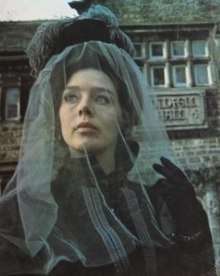Helen Graham (The Tenant of Wildfell Hall)
Helen Lawrence (married name is Helen Huntingdon but she is most commonly known under her alias Helen Graham) is the main female protagonist of Anne Brontë's 1848 novel The Tenant of Wildfell Hall. Helen was portrayed by Janet Munro in the 1968 TV adaptation and Tara FitzGerald in the 1996 miniseries.
| Helen Lawrence | |
|---|---|
 Helen Graham as portrayed by Janet Munro in the 1968 TV adaptation | |
| First appearance | The Tenant of Wildfell Hall |
| Created by | Anne Brontë |
| Portrayed by | Janet Munro, Tara FitzGerald |
| In-universe information | |
| Alias | Helen Graham |
| Nickname | Nell (by uncle) |
| Species | Human |
| Gender | Female |
| Title | Miss Lawrence / Mrs. Huntingdon |
| Occupation | Artist |
| Spouse | Arthur Huntingdon (1821-1828 (his death)), Gilbert Markham (from 1830) |
| Children | Arthur Huntingdon the Younger At least two children with Gilbert |
| Relatives | Mr. Lawrence (father) Mrs. Lawrence, née Miss Graham (mother, deceased) Frederick Lawrence (brother) Margaret "Peggy" Maxwell (aunt) Mr. Maxwell (uncle by marriage) Helen Hattersley (daughter-in-law) |
Biography
Helen Lawrence was born in 1802 (or in the first half of 1803) at Wildfell Hall. Rachel, later her maid and friend, takes care of infant Helen. Her mother dies when Helen is still too young to remember her. Immediately after that, her father, unwilling to take any care of a girl, sends Helen to her aunt, Mrs. Peggy Maxwell, at Staningley Hall.
At the age of eighteen Helen enters her first season, where she meets witty and handsome Arthur Huntingdon. She falls in love with him and eventually marries him, in spite of all his faults and strong disapproval of her aunt. Helen is firmly convinced that she can reform Arthur with gentle persuasion and good example.
One year after their marriage Helen gives birth to their son, also named Arthur, often referred to in the novel as Little Arthur. Huntingdon, who doesn't like his baby, becomes increasingly jealous of him and his claims on Helen's attentions and affections. He spends even more time with his dissolute friends and eventually begins an affair with Lady Lowborough. Walter Hargrave, Helen's unwanted admirer, tells her about it. Nevertheless, Helen plans to run away from Huntingdon and, therefore, violate the law,[1] only when he begins to encourage their son to drink and swear at his early age.
Unfortunately, Huntingdon learns of Helen's plans from her journal and burns her artist's tools (by which she had hoped to support herself). Unable to run away to America as she planned before, Helen, with help from her brother, Frederick, finds a secret refuge at Wildfell Hall. She lives there under an assumed name: Helen Graham (Graham is her mother's maiden name).
There she meets Gilbert Markham, a young farmer who falls in love with her. When he begins to believe the filthy gossip that is spread about her, she gives him her diary. From it Gilbert learns than Helen is a runaway wife. Soon after this, Helen goes back to Grassdale Manor where she discovers that Huntingdon has fallen from his horse (in a state of inebriation) and is badly injured. As he is unwilling to stop drinking alcohol, Arthur's health deteriorates and he eventually dies.
Now unburdened by her marriage to Arthur, Helen and Gilbert marry and have at least two children together. By the end of the novel, Little Arthur is grown up and is residing at Grassdale Manor with his wife, Helen Hattersley (the daughter of Milicent Hargrave and Ralph Hattersley).
Appearance
Helen is described by Gilbert in the first chapter of the novel when he sees her at church:
And there I beheld a tall, lady-like figure, clad in black. Her face was towards me, and there was something in it which, once seen, invited me to look again. Her hair was raven black, and disposed in long glossy ringlets, a style of coiffure rather unusual in those days, but always graceful and becoming; her complexion was clear and pale; her eyes I could not see, for, being bent upon her prayer-book, they were concealed by their drooping lids and long black lashes, but the brows above were expressive and well defined; the forehead was lofty and intellectual, the nose, a perfect aquiline and the features, in general, unexceptionable – only there was a slight hollowness about the cheeks and eyes, and the lips, though finely formed, were a little too thin, a little too firmly compressed.
Later he revealed that her eyes were very dark grey, almost black and a 'large, clear and full of soul'.
Notable portrayals
- Janet Munro in 1968 TV adaptation
- Tara FitzGerald in 1996 TV adaptation
- Hattie Morahan in 2011 BBC Radio 4 adaptation
References
- Introduction and Additional Notes for The Tenant of Wildfell Hall. Oxford University Press. 2008. ISBN 978-0-19-920755-8.